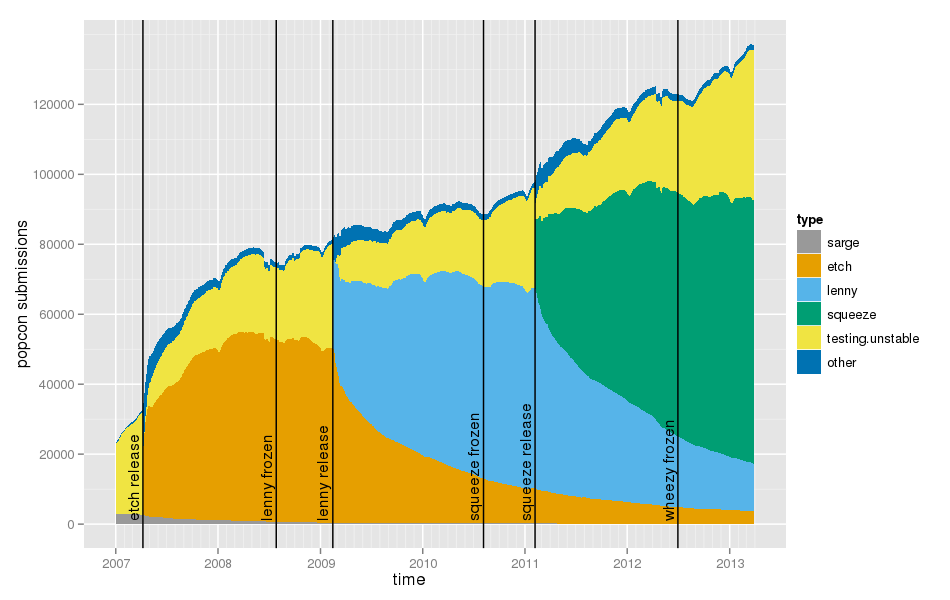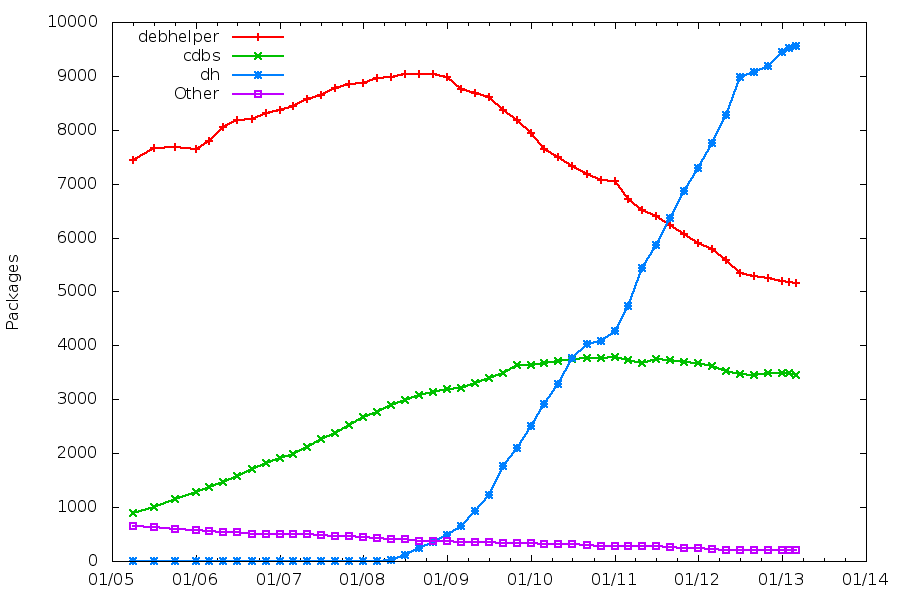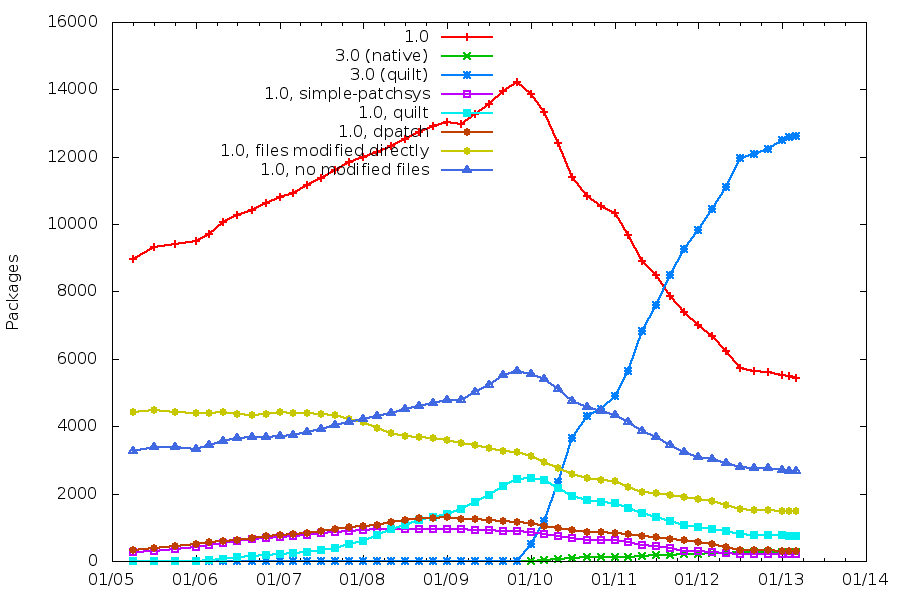This upload was the first one of my very first package in Debian. It was sponsored by Dafydd Harries, who I’ve finally met at DebConf13, and got out of NEW on 2005-08-16. Exactly 8 years ago today. I only realized that yesterday evening, and Debian’s birthday feels even more special to me now. Dafydd, it looks like I owe you a lot! :)
Category: PlanetDebian
DebConf
This DebConf is obviously quite special for me, being the DPL. It has really been great so far to talk to meet so many people, and especially to meet so many new Debian contributors or Developers. I’m really happy to see that the next generation is ready! :)
On Sunday, I delivered my Bits from the DPL talk. The video is available, and I’ve finally uploaded the slides (working link here, it seems that Penta ate my slides). I hope you enjoyed it/will enjoy it!
Debian releases used by popcon participants
The graph below is generated from popcon submissions. Since they include the version of the popularity-contest package, one can determine the Debian release that was used by the submitter (a new version of the popularity-contest package is generally uploaded just after the release to make that tracking possible).
The graph is similar to the one found on popcon, except that versions newer than the latest stable release are aggregated as “testing/unstable”.
Comments:
- Popcon submitters might not be representative of Debian users, of course.
- There’s quite a lot of testing/unstable users, and their proportion is quite stable:
- Today: testing/unstable: 43119 submissions (31.4%); squeeze: 75454 (54.9%); lenny: 13603 (9.9%)
- 2011-02-04 (just before the squeeze release): testing/unstable: 29012 (29.7%); lenny: 57262 (58.6%); etch: 10032 (10.3%)
- 2009-02-13 (just before the lenny release): testing/unstable: 30108 (36.9%); etch: 49996 (61.2%)
- I don’t understand why the number of Debian stable installations does not increase, except when a new release is made. It’s as if people installed Debian, upgraded directly to testing, and switched back to tracking stable after the release. Or maybe people don’t update their systems? A more detailed analysis could be done by looking at the raw popcon data.
- Upgrading to the next stable release takes time. Looking at the proportion of users still using oldstable one year after the release, it would be better not to remove oldstable from mirrors too early.
Scripts are available on git.debian.org.
Ideas from the -vote@ DPL election discussions
After one week of campaign on -vote@, many subjects have been mentioned already. I’m trying here to list the concrete, actionable ideas I found interesting (does not necessarily mean that I agree with all of them) and that may be worth further discussion at a less busy time. There’s obviously some amount of subjectivity in such a list, and I’m also slightly biased ;) . Feel free to point to missing ideas or references (when an idea appeared in several emails, I’ve generally tried to use the first reference).
On the campaign itself, and having general discussions inside Debian:
- have those discussions on a more regular basis, outside DPL elections (from lucas)
- use polls to measure consensus (from lucas, question from mjr)
- use a pre-arranged questionnaire that DPL candidates would fill in (from algernon)
On getting new users and contributors to Debian:
- discussion on the various steps: Debian user – first contribution – regular contributor – DM/DD (from lucas)
- maintain a single list of “paths in” (from moray and lucas)
- have some “neutral” people to ask about tasks, and to get suggestions from in response to explaining their current skills and experience (e.g. http://www.debian.org/women/mentoring) (from moray)
- more local meetings, compile list of regional contacts (moray)
- increase Debian presence at local meetings. Advertise the Debian Events initiative that facilitates that (from lucas)
- provide “Debian ambassador” title for students, similar to what is done by Google or Microsoft (from moray)
- re-work on advertising gift tags (bugs suitable for new contributors) (from lucas)
- make sure teams have list of easy tasks in their wiki pages (from lucas)
- discussion on student projects involving Debian (from lucas)
- do mentoring inside teams, like DebianMed’s MoM (from moray)
- participate in other internship-like programs, like Outreach Program for Women (link from lucas), or organize our own, which would also avoid some restrictions from GSoC (northern hemisphere only (point made by moray), restricted to students (ana))
- extend internship-like programs to other kinds of work (packaging, documentation, etc.)
- localize -mentors@ (mailing lists + IRC channels for DE, FR, ES contributors) (from lucas)
- organize IRC schools/seminars about e.g. packaging (from lucas)
- introduce more gamification in mentoring (from rra)
Infrastructure, processes, releases:
- improve infrastructure to help with team maintenance (e.g. PET) (from lucas)
- authorize NMUs for archive-wide changeovers such as /usr/doc -> /usr/share/doc (from moray)
- increase visibility of RC bugs squashers by listing them in Debian Project News (from lucas)
- provide inexpensive non-monetary gifts (free t-shirts?) to RC bug squashers (from lucas)
- re-open discussion on gradual freezes (from lucas), focus attention on more important packages by improving tools (from lucas) and removing packages earlier (from moray and lucas)
- involve upstreams and downstreams in RC bug fixing (from algernon)
Relationships with upstreams/downstreams:
- use Debian money to sponsor maintainers to attend upstream events (from lucas)
This list could be moved to wiki.d.o if others find sufficiently useful to help maintaining it.
Debian is (still) changing
(Looking for those graphs online, I realized that I never properly published them, besides that old post)
I’ve been playing with snapshot.d.o, which is a fantastic resource if you want to look at Debian from an historical perspective (well, since 2005 at least).
Team maintenance
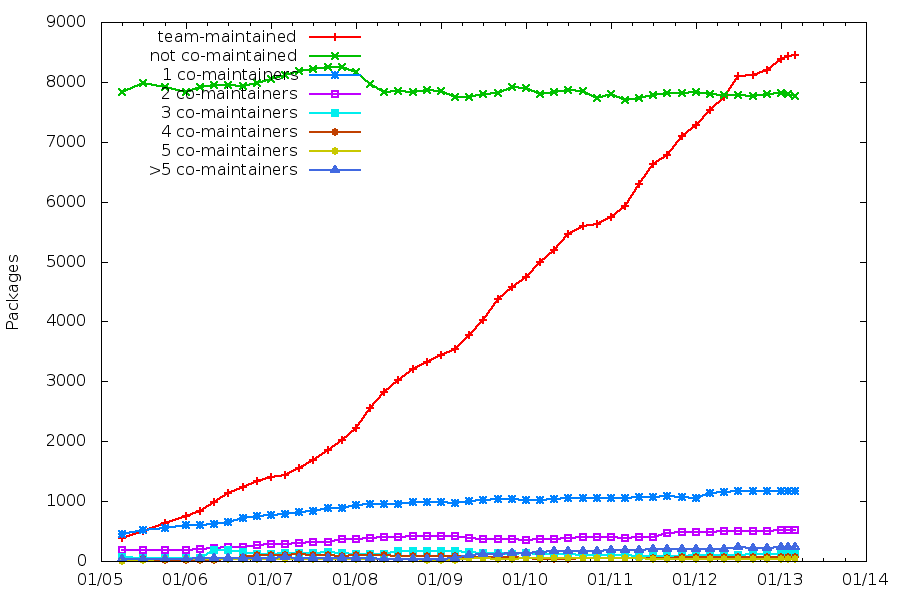
We now have more team-maintained packages than packages maintained by someone alone. Interestingly, the “small, ad-hoc group of developers” model does not really take off.
Maintenance using a VCS
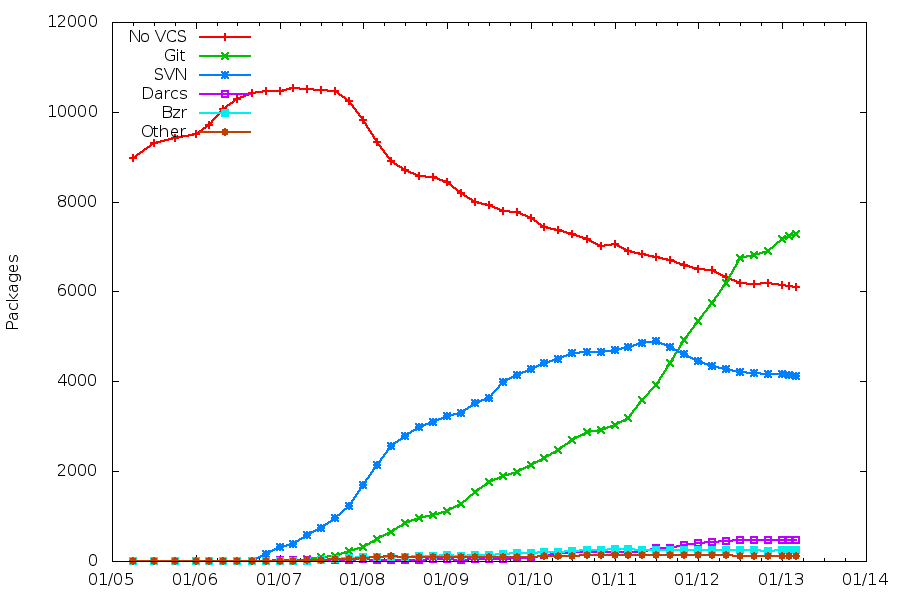
A large majority of our packages are maintained in a VCS repository, with Git being the clear winner now.
Possible goal for Jessie: standardize on a Git workflow, since every team tends to design its own?
Packaging helpers
Again, we have a clear winner here, with dh. It’s interesting to note that, while dh was designed as a CDBS killer, it kind-of fails in that role.
Possible goal for Jessie: deprecate at least pure-debhelper packaging?
Patch systems and packaging formats
Again, clear winner with 3.0 (quilt).
The (dirty) scripts that generate those graphs are available in Git (but you need to connect to stabile to execute them, and it’s rather time consuming — hours/days).
DPL game
When Francesca started her DPL game, I too started think about possible candidates. Here is my shortlist of dream candidates:
- <insert your name here>
- <or here>
- <or there>
- <or even there>
Seriously, if you are a DD, you have the right to run. There’s no need for someone to nominate you. If you think that you could possibly say something interesting during the discussion period, and can spare the time to participate in the -vote@ discussions, please run. DPL campaigns used to be a great time where Debian visions, goals, politics and random stuff were discussed. The more candidates, the more interesting campaigns (8 candidates in 2007!).
Also, there are already two three other candidates, so even if you don’t want the job, it’s not that risky.
(Initially, I thought about nominating everyone, but security-wise, it might not be such a great idea.)
Half of the package maintainers are not DDs or DMs
During the Paris Mini-Debconf, Nicolas Dandrimont talked about The state of mentors.debian.net: GSoC and beyond. He said that Half of Debian’s packages are maintained by sponsored maintainers. That statement was actually wrong, as he confirmed later.
However, using a few UDD queries, I could come up with:
- 3147 packages out of 18649 packages in sid (17%) were last uploaded using a sponsored upload.
- There are 963 distinct sponsorees, vs. a total of 2015 distinct emails in the Changed-By field of packages in sid. Given that it’s more likely for DDs to have used several emails to upload packages, it’s very likely that half of the package maintainers are sponsored maintainers.
- There are 2185 packages without a DD in either the Maintainer: or the Uploaders: fields. (That includes some packages that are maintained by a team that could include some DDs)
Full UDD notes:
all packages in sid: select source, version from sources_uniq where release = 'sid' packages in sid known to upload_history: select source, version from upload_history where (source, version) in (select source, version from sources_uniq where release = 'sid') packages that were uploaded by the changed_by person: create temporary table sources_not_sponsored as select distinct source, version from upload_history, carnivore_keys, carnivore_emails where (source, version) in (select source, version from sources_uniq where release = 'sid') and fingerprint = key and carnivore_keys.id = carnivore_emails.id and carnivore_emails.email = changed_by_email; packages not uploaded by the changed_by person: create temp table uh_sid as select source, version, fingerprint, changed_by_email from upload_history where (source, version) in (select source, version from sources_uniq where release = 'sid'); create temp table uh_sid_sponsored as select source, version, fingerprint, changed_by_email from uh_sid where (source, version) not in (select source, version from sources_not_sponsored); list with sponsor login: select distinct source, version, fingerprint, changed_by_email, login from uh_sid_sponsored left join carnivore_keys on fingerprint = key left join carnivore_login on carnivore_keys.id = carnivore_login.id; => 4188 sponsored packages. some of them are in a strange state (changed_by is a DD, but uploaded by another DD). excluding those: create temp table sponsored_but_dds as select distinct source, version, fingerprint, changed_by_email, login from uh_sid_sponsored, carnivore_emails, carnivore_login where changed_by_email = carnivore_emails.email and carnivore_emails.id = carnivore_login.id; create temp table really_sponsored as select distinct source, version, fingerprint, changed_by_email, login from uh_sid_sponsored left join carnivore_keys on fingerprint = key left join carnivore_login on carnivore_keys.id = carnivore_login.id where (source, version) not in (select source, version from sponsored_but_dds); => 3147 sponsored packages select distinct changed_by_email from really_sponsored ; => 963 different sponsorees select distinct changed_by_email from upload_history where (source, version) in (select source, version from sources_uniq where release = 'sid'); => 2015 distinct emails. no DD amongst maintainer or uploader: create temp table dds_emails as select email from carnivore_emails, carnivore_login where carnivore_emails.id = carnivore_login.id; select source, version, maintainer, uploaders from sources_uniq where release='sid' and maintainer_email not in (select * from dds_emails) and not exists (select * from uploaders where release = 'sid' and sources_uniq.source = uploaders.source and sources_uniq.version = uploaders.version and email in (select * from dds_emails)) and maintainer_email != 'packages@qa.debian.org' and (source, version) in (select source, version from really_sponsored);
Mini-debconf lightning talk: Get involved! It’s not that hard!
This week-end I attended the Paris Mini-Debconf, which was really a great event, and a nice opportunity to meet everybody again.
I delivered a lightning talk on “Get involved! It’s not that hard!“, which was also a good excuse to mention the Debian packaging tutorial and the Debian Maintainer Dashboard.
Release Critical Bugs report for week 43
During the Squeeze release cycle, Alexander Reichle-Schmehl used to blog every week about this. Let’s try to continue the tradition.
The UDD bugs interface currently knows about the following release critical bugs:
- In Total: 916
- Affecting wheezy: 464
That’s the number we need to get down to zero before the release. They can be split in two big categories:- Affecting wheezy and unstable: 327
Those need someone to find a fix, or to finish the work to upload a fix to unstable:- 77 bugs are tagged ‘patch’.
Please help by reviewing the patches, and (if you are a DD) by uploading them. - 17 bugs are marked as done, but still affect unstable.
This can happen due to missing builds on some architectures, for example. Help investigate! - 235 bugs are neither tagged patch, nor marked done.
Help make a first step towards resolution!
- 77 bugs are tagged ‘patch’.
- Affecting wheezy only: 137
Those are already fixed in unstable, but the fix still needs to migrate to wheezy. You can help by submitting unblock requests for fixed packages, by investigating why packages do not migrate, or by reviewing submitted unblock requests.
- Affecting wheezy and unstable: 327
- Affecting wheezy: 464
Note: I’m looking for someone to send this posts on a regular basis. All you need is a blog syndicated on Planet Debian (there’s a secret UDD page that generates the HTML code for you ;) ). Contact me if you are interested. taken!
Debian Maintainer Dashboard update
I’ve spent some more time on Debian Maintainer Dashboard (DMD), a maintainer/team-centric dashboard relying on Ultimate Debian Database.
Done:
– added tabs (jquery really rocks) — see example
– added a hacking.html file that describes how to setup a development environment
– created a pad (http://debian.titanpad.com/DMD) to store ideas.
TODO:
– recruit contributors ;)
